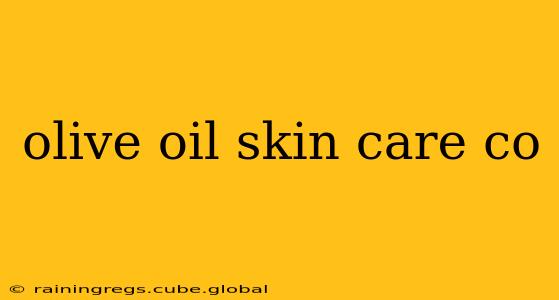Olive oil, a culinary staple for centuries, is also a powerhouse ingredient in skincare. Its rich composition of antioxidants, vitamins, and fatty acids makes it a versatile and effective solution for a variety of skin concerns. This comprehensive guide delves into the benefits, uses, and considerations of incorporating olive oil into your skincare routine.
What are the benefits of using olive oil for skincare?
Olive oil's skincare benefits stem from its abundance of beneficial components. Squalene, a naturally occurring lipid, helps maintain skin's moisture barrier, preventing dryness and dehydration. Vitamin E, a potent antioxidant, combats free radical damage, protecting against premature aging and sun damage. Oleic acid, a monounsaturated fatty acid, softens and moisturizes the skin, reducing inflammation and irritation. These combined properties make olive oil suitable for various skin types, though individual responses may vary.
What types of olive oil are best for skincare?
Not all olive oils are created equal. For skincare purposes, extra virgin olive oil (EVOO) is the preferred choice. EVOO is minimally processed, retaining its high concentration of beneficial compounds. Look for oils that are cold-pressed and certified organic to ensure purity and quality. Avoid refined olive oils, as processing strips away many of the beneficial components.
How can I use olive oil for different skincare concerns?
Olive oil's versatility makes it adaptable to various skincare needs:
Moisturizer: Olive oil's emollient properties make it an effective moisturizer, especially for dry or dehydrated skin. Apply a small amount to damp skin after showering or cleansing.
Makeup remover: Its gentle yet effective cleansing properties make it an ideal makeup remover, effectively dissolving even stubborn mascara. Simply apply a small amount to a cotton pad and gently wipe away makeup.
Treatment for dry, cracked skin: Olive oil's high fatty acid content helps to heal and repair dry, cracked skin on the hands, feet, or elbows. Apply liberally and allow it to absorb.
Hair care: Olive oil can also be used as a hair mask to condition and moisturize dry, damaged hair. Apply to your hair, leave it on for 30 minutes to an hour, then shampoo and condition as usual.
Is olive oil suitable for all skin types?
While generally well-tolerated, olive oil may not be suitable for everyone. Individuals with acne-prone skin might find that it clogs pores, leading to breakouts. It’s crucial to perform a patch test before widespread application to assess your skin’s reaction. Start with a small amount on a discreet area and monitor for any irritation or adverse effects.
Can I use olive oil as a sunscreen?
No, olive oil should not be used as a sunscreen. While it contains some antioxidants, it does not provide adequate protection against harmful UV rays. Always use a broad-spectrum sunscreen with an SPF of 30 or higher for adequate sun protection.
How often should I use olive oil on my skin?
The frequency of olive oil use depends on your skin type and the specific application. For moisturizing, daily use may be beneficial for dry skin, while those with oily skin might opt for less frequent application. For hair masks or spot treatments, once or twice a week is usually sufficient.
Are there any potential side effects of using olive oil on my skin?
While generally safe, some individuals may experience mild side effects such as clogged pores, breakouts, or allergic reactions. If you experience any irritation or discomfort, discontinue use and consult a dermatologist.
Where can I buy high-quality olive oil for skincare?
High-quality extra virgin olive oil can be found at most grocery stores, health food stores, and online retailers. Look for oils with certifications indicating organic production and cold-pressing methods.
By understanding the benefits and potential drawbacks of olive oil for skincare, you can make informed decisions to incorporate it effectively into your routine. Remember to always perform a patch test before widespread use and listen to your skin's needs.
